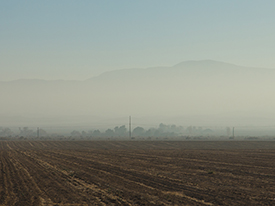 December seems long gone, along with the big storms it brought. The weeks of dry, sunny and windless winter weather contribute to California’s ongoing drought, and they also have a hard impact on air quality.
December seems long gone, along with the big storms it brought. The weeks of dry, sunny and windless winter weather contribute to California’s ongoing drought, and they also have a hard impact on air quality.
There’s not too much we can do to change the weather, which is caused by the winter inversion, the high pressure ridge that sits above the Bay Area and prevents the cool winter air from mixing or rising. But, there are things we can do to reduce the impact and harm of these polluted, dry winters. We’ll all be healthier and breathe easier if mandatory regulations are followed.
The Bay Area Air Quality Management District has been announcing “Spare the Air” days for most of the month, recently reaching the record number of 11 days in a row. Spare the Air signals a 24 hour ban on burning wood, which is the biggest single contributor to particulate matter (PM) in the air, accounting for 38% of that pollutant. High levels of particulate matter are especially hazardous for children, elderly, and those who suffer from asthma and other respiratory conditions. Read more about the health effects of particulate matter from the Spare the Air website here. Low-income communities of color are disproportionately impacted by these poor air quality conditions, because they are more likely to have pre-existing conditions from living in neighborhoods that have high baseline levels of air pollution year-round. For more on this connection, read the section “Air Quality” from the report Life and Death From Unnatural Causes by the Alameda County Department of Public Health.
This weather isn’t only cause for concern in the Bay Area. We often share air and air pollution with the Central Valley, where the worst impacts of the drought are already being felt by farmers and rural residents who rely on wells for their water. Check out this article from November, when air pollution levels were extremely unhealthy in the Central Valley for days in a row.
You can get alerts about Spare the Air days, and more are likely this winter season, by calling 1-877-4NO-BURN. This is also the number to call to report a wood burning or wood smoke complaint. Please note that there is one exception to the burn ban – when a wood stove or fireplace is the only functional source of heat. You can also subscribe to email Spare the Air alerts, click here.
[Photo of Kern County from last winter by staticantics on Flickr]



